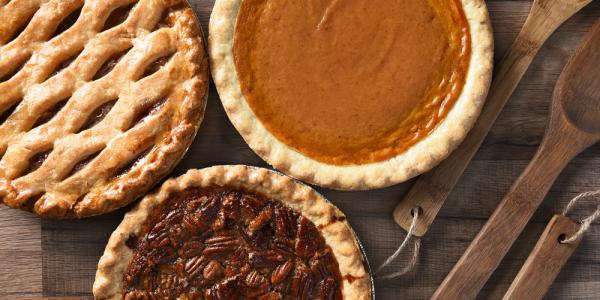Eating Well in the Midst of Plenty

Learn to trust yourself even when there's lots of food around.
Maybe you’ve had this experience. You walk into the break room and there it is: a whole box of bagels, or a tray of cookies or donuts – brought in by a well-meaning co-worker. You’re caught off guard. Or maybe you’ve come to expect it. Food, it seems, can be found everywhere.
Plenty of food. It happens often. It happens whenever you choose to dine in the cafeterias on campus. How about those potluck meals in your department? And eating a meal out in most any restaurant can look and feel like a lot of food.
While these situations could happen any time of year, holidays seem to increase the frequency. Celebration meals with friends and family include delicious food galore. Holidays are the perfect time for every cook you know to pull out all the stops. Aunt Meg makes every traditional family favorite; while Uncle Mike offers a new dish – or two – he just had to try. And then pressure to eat from the loving cook with statements like, “I made it just for you” or, “You didn’t eat it. Didn’t you like it?”
In situations like these, do you feel a sense of excitement…or dread?
If you do feel dread, that feeling likely comes from an ongoing struggle with eating:
On one hand, saying, “I shouldn’t eat that.” Trying to control.
On the other hand, breaking the rules and eating it. Feeling out of control.
While struggle with eating has become common, it’s normal to get excited about eating holiday meals and other tasty food. Hunger and appetite are internal cues from your body urging you to take action, that is, to get food. Taking care of your hunger with appealing food is, quite naturally, pleasurable and exciting. If you would like to find more pleasure in eating, you may want to consider making peace with food. While your brain gets rigid and unbending when it comes to rules, your body just wants to relax and enjoy the moment. You can learn to trust your body to know how much to eat.
Try this step-by-step process that you repeat throughout your day:
Feed yourself faithfully: Begin with what may seem to be an unlikely step – make sure you’re fed. Having regular and reliable meals means you will be hungry at predictable times. You also will know there’s another meal coming. You are less likely to grab and eat food that’s setting around.
Go to meals hungry: This step may seem like an “of course” kind of thing. Yet one of two situations can happen that gets in the way of a seemingly simple step.
One situation is sipping and munching in between meals. Sipping on soda pop or juice or even more fun drinks and snacking on those setting-around foods. Many holiday meals begin with appetizers – a curious term that could just as easily be called hunger-killers! Arriving at the meal not at all hungry can take away the excitement. You may end up eating anyway, just not enjoying it much.
The other situation happens when you go along with the temptation to under eat before the anticipated feast. When looking forward to a meal where there’s plenty of delicious food, it seems logical to skip a meal, cut down, or not eat at all. The problem is, you’re famished. Starting to eat when you’re famished makes paying attention to the food difficult. Not only is it harder to enjoy your meal, you’re more likely to eat until you’re stuffed.
Choose food you enjoy: It’s alright to get the food you want. Peruse the table, home in on the foods you want most, and pass on the foods you don’t much care about. This is difficult. After all, the cooks are watching! In reality it’s likely people won’t pay as much attention to your plate as you might imagine.
Reassure yourself: “It’s alright to eat as much as I want. I just have to pay attention.” Paying attention takes practice. Consider starting now so you are skilled at it when the time comes for the feast.
Here’s one way to pay attention to your eating: Pause for a moment, take a centering breath, notice how your body feels, cue-in to the food (look at it, smell it), take a bite, pay attention to your mouth while you eat the first bite, wait to get another bite ready until after you swallow the first one.
Go ahead and eat as much as you want. Get more of the foods you particularly enjoyed.
Stop when you feel like it: Stopping can be difficult in the midst of delicious food. Have you ever noticed as you’re eating along that it’s not so delicious anymore? When your senses tell you it’s not so delicious, you can stop. But you don’t have to. When you reach that point, try taking a test bite or two to help you be sure. If you want to keep going, that’s okay too.
Remind yourself, “I get to do this again”: It may not be the exact same delicious foods. After all, Aunt Meg prepares the feast only once a year… maybe twice. But there will be other tasty foods coming your way. Again, and again.
Eat well this holiday season. And every other day when there’s plenty of food to enjoy.
Related Articles

The weight is over: How to leave office ‘weight talk’ in the past
Return to the office with simple strategies to resist weight and body image concerns.

Focused Eating in a World of Distraction
Finding a quiet moment in a world of technology is difficult. Distractions are at the touch of a button. Review Abby's suggestions to help you pay attention and enjoy your meals and snacks.

It's a 2020 Thanksgiving - Enjoy It!
Yes, Thanksgiving might look different this year. It’s time to make the most of it and share thanks with those in your “bubble.” Here are some tips to perk up your day and share your best with those you’ve been blessed to join you in giving Thanks.

Look North for Joy in Dietary Advice
O Canada, you're the latest to acknowledge that pleasure in eating is not only okay, but important! You have left US behind.





